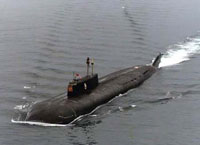Two Russian Nuclear Submarines Make USA Shake With Fear
Two Russian nuclear submarines have been patrolling the USA’s East Coast during the recent several days, The New York Times wrote. One of the submarines was detected Tuesday about 200 miles off the US coast, anonymous sources at the Pentagon said.

The whereabouts of the other submarine are not known. The sub was reportedly traveling towards Cuba, whereas other pieces of information say that it was heading north.
Russian submarines have never approached US coasts so close since the end of the Cold War. The above-mentioned submarines are the subs of 971 Project (Akula).
Pentagon officials said that they were not concerned about the appearance of the Russian submarines in the Pacific Ocean. The submarines are traveling in international waters, and Russia has a right to hold naval drills in different parts of the world, they said.
Experts say that US nuclear submarines conduct a lot more of similar missions than Russian, French, British and Chinese submarines altogether, RBC news agency reports.
Project 971 Shchuka-B, ('Shchuka' meaning ‘pike,’ NATO reporting name "Akula"), is a nuclear-powered attack submarine (SSN) first deployed by the Soviet Navy in 1986. The class is sometimes erroneously called the "Bars" class, after one of its members. Note that Akula ("shark") is the Soviet designation of the ballistic missile submarine class designated by NATO as the Typhoon class submarine.
There are three sub-classes or flights of Shchuka, consisting of the original seven "Akula I" submarines which were built between 1982 and 1986, five "Improved Akula" submarines were built between 1986 and 1991, and four "Akula II" submarines were built from 1991. This information is disputed, however, as the distinction between the Improved Akula and the Akula II class is debated by authoritative sources. The Russians simply call all of the submarines Schuka-B, regardless of modifications, and it is rumoured that no two are alike.
The Akula incorporates a double hull system composed of an inner pressure hull and an outer "light" hull. This allows more freedom in the design of the exterior hull shape, resulting in a very hydrodynamic submarine compared to western counterparts at the time.
Subscribe to Pravda.Ru Telegram channel, Facebook, RSS!





